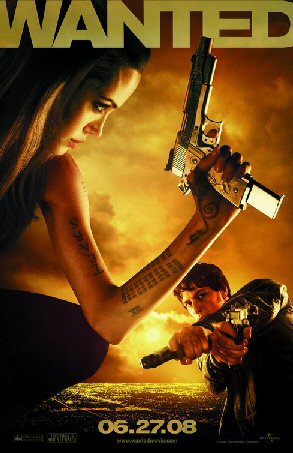|
Wanted
Somewhere in
Hollywood, there stands a great loom, weaving together threads
of plot. Sometimes the thread comes from a novel, sometimes
from comic books and sometimes from other sources I'm too
lazy to think about. If the thread is unbroken, you get
a good movie. If the thread is Wanted, you don't
even have to bother unraveling the cloth. That will take
care of itself.
Adapted
by Michael Brandt and Derek Haas, Wanted throws out
most of its comic book roots, keeping the basic frame of
loser Wesley Gibson (James McAvoy) discovering that his
unknown father had amazing skills with a gun, and that he
has inherited them. It's up to Wesley to go through a crash
course in his ballistic abilities in order to avenge his
father's death.
Where Wanted
starts flailing about is in looking for some sort of moral
identification. In Mark Millar and J.G. Jones' original
comic book, the world has been taken over by super-villains,
with Wesley's father having been one of the most powerful.
Sure, the book had a strongly amoral edge, but at least
it was true to it.
Rather than
that, Brandt, Haas and Director Timur Bekmambetov place
Wesley among a League of Assassins, started by a medieval
Guild of Weavers, calling itself by the arcane name of …The
Fraternity. It seems these weavers realized that Fate communicated
through the threads of their finest cloth, and offered up
the names of people whose deaths must occur in order to
maintain stability in the world. You may, in fact, remember
when young Saddam Hussein and Osama bin Laden were assassinated
before they could cause any trouble.
Led by the authoritative
yet reassuring Sloane (Morgan Freeman), the Fraternity needs
Wesley to go after their rogue member, Cross (Thomas Kretschmann),
the man who killed his father in a spectacular opening sequence.
Wesley's training falls into the supple yet deadly hands
of Fox (Angelina Jolie), who, in true Jolie action star
mode, sounds like she's gently orgasming whenever she gets
involved with violence.
The bizarre
thing here is that the screenwriters kept most of the super-villain
names and even left the rat-obsessed "Exterminator" largely
untouched. Here, though, they're without context, and it
won't be long before you also start wondering why very few
police seem to ever show up in a city clearly riddled with
random acts of violence and multiple executions. Everybody
has been reduced to shadows of the four-color characters
they once were, now trapped in a world that hasn't just
grown dark but also curiously muted.
Bekmambetov
could easily have handled a more vibrant and direct adaptation.
As bereft of sense as the script is, the visuals in this
movie are exciting and often astounding. They're so powerful,
it's obvious that the script often got tinkered just to
provide an excuse for the director's vision.
Bullets curve
because man, that just looks cool. The screenwriters scramble
to provide a punchline justification for it, but even that
breaks the rules they already set up. To match that awesome
shot of Wesley's father jumping through a glass window,
the Fraternity has a healing candle wax bath - except later,
they really need people to be able to have conversations
from it, so it becomes liquid without explanation.
The
movie does capture the patheticity of Wesley's life, even
if the charismatic McAvoy can't quite capture a Chicago
accent. But the screenwriters substitute a change of situation
to make up for any logical character arc. Wesley gets handed
new knowledge, with no struggle to go from nebbish to overconfident
jerk.
Yet
there's frustration in how close this comes to being entertaining.
The visuals prove there's a good film in Bekmambetov if
he can learn to tell a coherent story, and learn to handle
actors. He's got some really good ones here. Besides McAvoy,
rapper Common shows that he's got a pretty good screen presence,
when everyone else isn't being blown away by Freeman. The
man might flirt with hackdom, but he never gives a bad performance.
At times, it's almost subtle - and in this movie, that's
no mean feat.
For
subtlety is not a word you can use with Wanted. Then
again, what it proved to me is it's also one I can't use
with comic book writer Millar's work, either. Perhaps the
high concept pulled the wool over a lot of readers' eyes,
and a few studio executives. Here's hoping it doesn't blind
audiences.
|







